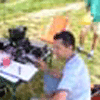Amateur Radio responds to flooding in Western Europe
Jul 16, 2021 - Emergency Comms - Greg, G0DUB
Unprecedented heavy rain caused widespread flooding in Germany, Belgium and the Netherlands with over 120 deaths and hundreds more people unaccounted for. The rains which started on Wednesday caused rivers to burst their banks and the water converged into major rivers like the Meuse, Mosel and Rhine causing damage to bridges and other infrastructure such as power and telecommunications networks.
The Dutch Amateur Radio Emergency Service ( DARES ) was on standby from Wednesday evening as the first reports of flooding came in, with an initial attempt to establish a point to point link from the Provincial capital of Maastricht to the north of Limburg province, this was halted due to heavy traffic as citizens followed calls to evacuate low lying areas. DARES members were in contact with members of the Belgian Emergency Amateur Radio Service ( B‑EARS ) to co-operate and co-ordinate their work.
The European Civil Protection mechanism was activated and emergency groups across the region reported their Governments sending extra assistance and supplies to the areas where damage was worst. The surge in flood water was continuing to make its way North leading to further evacuations and the Radio Amateur Emergency groups started to get more focused requests with B‑EARS being asked to provide a backup VHF link between the emergency call centre in Brussels and the province of Hainaut through Friday while DARES had four stations active in the Limburg area ready to respond if an issue occurred.
The most loss of life and damage has occurred in Germany where over 1000 people remain unaccounted for and the loss of mobile networks has slowed the effort to locate people while many others are without power or homes. The emergency communications unit of the DARC is handling enquiries for amateur radio support in the worst hit areas but this is not always easy to achieve as members in the area have been directly affected losing equipment or their homes.
Emergency communications groups in the affected, and surrounding countries, are ready to respond to requests made and are working well together, co-ordinating their response as needed. This emergency will last for some time as infrastructure is repaired and the threat from damaged dams and more rainfall is reduced.

Unprecedented heavy rain caused widespread flooding in Germany, Belgium and the Netherlands with over 120 deaths and hundreds more people unaccounted for. The rains which started on Wednesday caused rivers to burst their banks and the water converged into major rivers like the Meuse, Mosel and Rhine causing damage to bridges and other infrastructure such as power and telecommunications networks.
The Dutch Amateur Radio Emergency Service ( DARES ) was on standby from Wednesday evening as the first reports of flooding came in, with an initial attempt to establish a point to point link from the Provincial capital of Maastricht to the north of Limburg province, this was halted due to heavy traffic as citizens followed calls to evacuate low lying areas. DARES members were in contact with members of the Belgian Emergency Amateur Radio Service ( B‑EARS ) to co-operate and co-ordinate their work.
The European Civil Protection mechanism was activated and emergency groups across the region reported their Governments sending extra assistance and supplies to the areas where damage was worst. The surge in flood water was continuing to make its way North leading to further evacuations and the Radio Amateur Emergency groups started to get more focused requests with B‑EARS being asked to provide a backup VHF link between the emergency call centre in Brussels and the province of Hainaut through Friday while DARES had four stations active in the Limburg area ready to respond if an issue occurred.
The most loss of life and damage has occurred in Germany where over 1000 people remain unaccounted for and the loss of mobile networks has slowed the effort to locate people while many others are without power or homes. The emergency communications unit of the DARC is handling enquiries for amateur radio support in the worst hit areas but this is not always easy to achieve as members in the area have been directly affected losing equipment or their homes.
Emergency communications groups in the affected, and surrounding countries, are ready to respond to requests made and are working well together, co-ordinating their response as needed. This emergency will last for some time as infrastructure is repaired and the threat from damaged dams and more rainfall is reduced.




 . . . . . . . . . . .
. . . . . . . . . . . 







